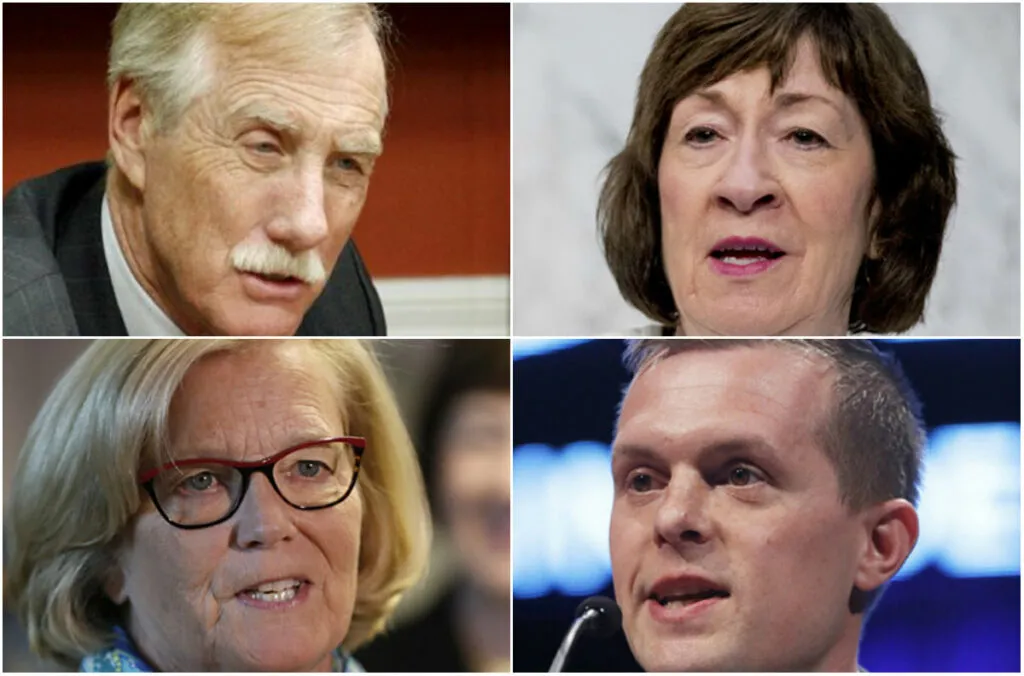
PORTLAND — Republicans and Democrats shifted their attention Wednesday to the court of public opinion as they seek to cast blame for the federal government shutdown.
Nonessential functions of the federal government shut down at midnight Tuesday after the U.S. Senate failed to reach an agreement on a stop-gap funding bill before the end of the fiscal year.
Both parties believe the other will be blamed, making it unlikely that either will agree to concessions to end the shutdown anytime soon.
U.S. Rep. Chellie Pingree, D-1st District, held a press conference Wednesday at the Portland International Jetport after returning from Washington, D.C. She said Republicans own the shutdown because they control the White House and Congress and have refused to negotiate.
“It is important for us to fight back,” Pingree said, adding that Democrats’ demands for health care are needed now to help working families.
That messaging faces headwinds in Maine and elsewhere, though.
Pingree was the only member of the Maine delegation to oppose the Republicans’ spending proposal — a move that Democratic U.S. Rep. Jared Golden and Independent U.S. Sen. Angus King warned will only empower President Donald Trump to further reshape the federal government.
“This government shutdown is the result of hardball politics driven by the demands far-left groups are making for Democratic Party leaders to put on a show of their opposition to President Trump,” Golden said in a written statement.
The politics of the shutdown could play a major role in the 2026 midterm elections, when Pingree, Golden and Republican U.S. Sen. Susan Collins face reelection.
Democrats believe their focus on extracting concessions on health care and Trump’s use of executive power will resonate with the public, especially as some people begin receiving notices about increasing premiums under the Affordable Care Act.
Republicans are equally confident, saying their proposal would continue funding levels set under former President Joe Biden and have criticized Democratic demands to add over a trillion dollars in spending to the temporary funding bill.
Republicans also are making the claim that Democrats want to provide health care to people who are in the country illegally, but that’s not true. Illegal immigrants are barred from receiving federal aid for programs like Medicare and Medicaid and Democrats are only looking to roll back Medicaid cuts in Trump’s mega-bill, which prohibits immigrants who are lawfully present from receiving benefits.
The current dynamics make it hard to see a quick resolution to the shutdown, said Mark Brewer, chair of political science at the University of Maine.
“Right now, there’s no clarity on who’s going to get blamed, so that’s less incentive for anybody to reach a deal on this,” Brewer said, adding that he thinks Democrats are taking a larger political risk.
“The longer this shutdown drags on, the more real world pain it causes and as that happens public opinion can shift, the narrative can shift, and then we might see something change,” Brewer said. “But all that takes time. And all this uncertainty doesn’t bode well for a quick resolution.”
Collins put the blame squarely on Senate Minority Leader Chuck Schumer of New York, someone with whom she has clashed with frequently.
Schumer was criticized by fellow Democrats earlier this year for supporting a short-term Republican spending bill, known as a continuing resolution, and has reportedly been pressured by progressives to pushback against Trump more vigorously.
The increased polarization of the Senate could make a compromise more elusive, said Nicholas Jacobs, a political science professor at Colby College.
“The Senate’s old center of dealmakers has hollowed out,” Jacobs said. “With fewer swing-state incumbents under pressure to resolve things, a longer shutdown is more likely.”
“The irony – the paradox is – by shutting the government, we’re actually giving Donald Trump more power,” he said. “And that was why I voted yes. I did not want to hand Donald Trump and Russell Vought and Stephen Miller additional power to decimate the federal government, to decimate the programs that are so important to so many people.”
Vought is the director of the Office of Management and Budget, which has broad authority to determine which workers are essential and which workers will be furloughed, and Miller is an influential advisor to the president. Both have been instrumental in pushing the boundaries of presidential power.
Golden made a similar argument after being the only House Democrat to support the Republican proposal.
King joined Democratic Sens. John Fetterman of Pennsylvania and Catherine Cortez Masto of Nevada in supporting the Republican proposal. But the proposal is still five votes short of the 60 needed to end the shutdown.
Jacobs said the defections of King and other Democrats may be a sign that Schumer, who faced criticism from progressives earlier this year for not shutting down the government, may have a hard time keeping his party unified.
“Maybe there are more cracks than we’ve been led to believe,” he said.
Golden said in a written statement on Wednesday that King joining him and Collins in supporting the Republican proposal “is a positive sign that reason will ultimately prevail.”
Gov. Janet Mills’ office did not respond to questions on Tuesday about the governor’s opinion of the Democrats’ shutdown strategy.
But Mills, who has said she’s “seriously considering” running for U.S. Senate against Collins, jumped into the fray Wednesday, blaming Republicans for the shutdown and saying “this type of dysfunction is exactly what Maine people can’t stand about Washington.”
“I do not consider health care to be ‘an insane policy demand,’ as some have said,” she said. “This is not complicated: people want access to affordable health care and they want a government that works. Maine people deserve both, and Republicans should stop standing in the way.”
Pingree pushed back on the notion that the Republican proposal continued funding levels set under Biden. She said the continuing resolution includes a series of spending cuts and holds that have been criticized as illegal and unconstitutional.
She dismissed concerns raised by King, Golden and others that a shutdown would further empower Trump.
“This president has taken that power over the last nine months,” she said. “This is our opportunity to push back and say you can’t exclude Congress when you’re making these decisions.”



